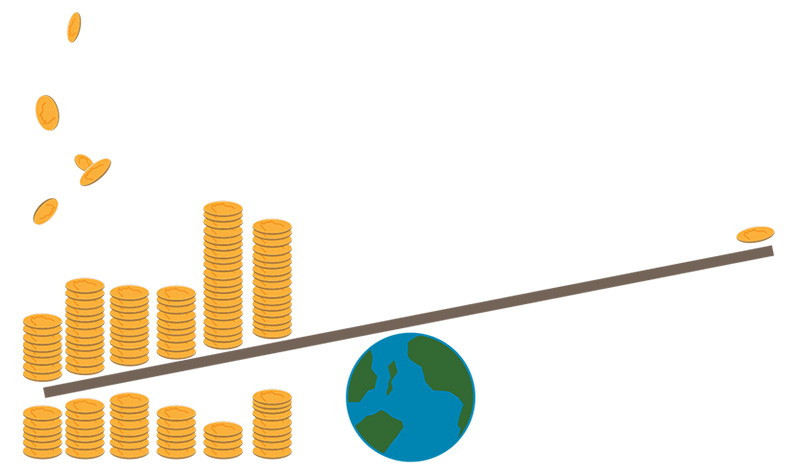Growing income inequality: why you should care
Diminishing middle class needs to wake up
In the 30 years after the Second World War, the middle class in North America expanded and prospered to a historically unprecedented extent, as more people gained a good education, the manufacturing sector offered plentiful, high-paying jobs, and there existed an implicit social contract that employers and employees would share fairly in the fruits of their collective efforts.
Each generation assumed that they would be better educated, wealthier and live longer than their parents.
This appeared to be the inexorable march forward of modern history.
It wasn’t.
Beginning in roughly 1975, a fundamental reversal began taking hold and has accelerated steadily.
The proportion of national income (on an annual basis) and wealth (cumulative) accruing to the middle-class has declined precipitously, while an increasingly small group of people (categorized alternatively as the top 10 per cent, one per cent, or even 0.1 per cent) have benefitted beyond their wildest dreams.
One per cent of the population now controls over 40 per cent of the wealth in the United States.
The top 10 per cent controls over 52 per cent, leaving the remaining 48 per cent for everyone else.
Middle-class incomes and standards of living have dropped, in absolute as well as relative terms.
These developments amount to a massive redistribution of income and wealth upward, toward those who were already well off.
More and more people are falling out of the middle class in a “winner takes all” economy.
This redistribution has already had a calamitous effect on tens of millions of people and will only get worse unless the middle class wakes up and smells the coffee.
Many factors have contributed to skyrocketing income and wealth inequality. Although economists differ about their relative importance, all of the following factors have been instrumental:
• After decades of relentless attack, labour unions have decreased greatly in economic and political power.
• Increasingly sophisticated technology has eliminated many low-skill jobs and “dumbed-down” many others.
• Free-trade agreements, more accurately called free movement of capital agreements, have contributed to a globalized economy in which employers have enormous power and middle-class workers have little power.
• Income taxes have become less and less progressive, as top marginal rates overall have been relentlessly lowered. Moreover, the rate of taxation on the types of income received disproportionately by wealthy individuals (i.e., capital gains and dividends) has also been lowered, while the rate of taxation on the types of income received disproportionately by middle-class individuals (i.e., wages and salaries) has remained the same or even increased.
• In a media-driven world, the cost of political campaigns has increased enormously, forcing politicians to raise $100 million or more in contributions just to be competitive. In turn, this reality has made politicians far more beholden to wealthy campaign contributors.
• A radically conservative ideology, featuring absolute faith in free markets as self-correcting and totally without need of regulation by government in the public interest, has taken hold. Indeed, this ideology holds that the very notion of a public interest separate from free markets is old-fashioned and misguided. Applied to the financial industry in the U.S., it led to de-regulation and the financial collapse of 2008, which cost the middle-class roughly 40 per cent of their net worth.
How has radical redistribution of income upward affected middle-class people?
They are working longer hours at insecure jobs for less pay.
Families with two adults working full time and yet still barely above the poverty line are becoming the new norm.
Children are being neglected by exhausted, stressed-out parents.
Family violence and breakdown are epidemic.
Tens of thousands of people have lost homes they can no longer afford.
Rates of mental disorder, suicide and addiction are soaring.
As chronic stress takes its toll on health, for the first time in modern history average life expectancy is decreasing.
“ This redistribution has already had a calamitous effect on tens of millions of people and will only get worse unless the middle-class wakes up and smells the coffee.
Social cohesion, sense of community and hope for a better future are all falling through the floor.
The middle-class dream is fading into a soon-to-be-forgotten past.
However, the harmful effects of excessive income and wealth inequality don’t stop with middle-class people and their families.
Recent economic research has shown that it also destabilizes the economy as a whole, making future crashes and recessions more probable and longer lasting.
The crash of 2008 and the past four years of misery may be only a preview of things to come.
Canada has escaped some of the worst economic excesses and their consequences by not buying into radical conservative ideology to the same extent as the United States. We have always had a stronger belief in collective action to protect the public interest in areas such as health, education and the environment.
Nonetheless, we are not immune from the siren call of free markets and radical personal responsibility.
Income inequality and its attendant problems have increased significantly in Canada, for many of the same reasons articulated above.
Programs that serve the public interest are slowly being whittled away under the now-familiar guise of fiscal responsibility and economic competitiveness.
These developments are neither random nor inevitable. They are the predictable consequences of conscious policies that favour the wealthy over the middle class, the more powerful over the less powerful, and private interests over the public interest.
Left unopposed, they will continue to diminish your quality of life, health, hopes for a better future and even the length life itself.
Coffee, anyone?
Bruce Tefft is an associate professor of psychology at the University of Manitoba.
Published in Volume 67, Number 10 of The Uniter (November 7, 2012)







